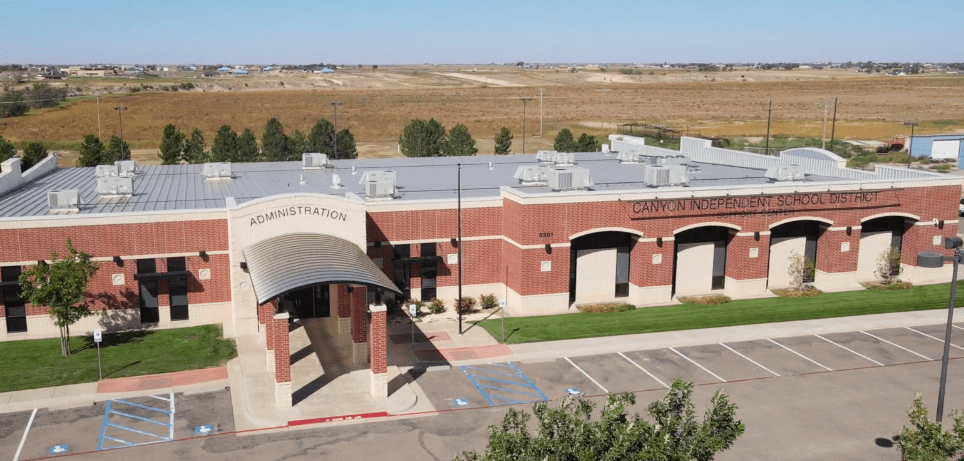Some school board trustees apparently find it addictive to employ authoritarian tactics to exclude voters.
In a previous commentary, I detailed the machinations of the Canyon, Texas Independent School District (CISD) Board of Trustees unjustifiably using their statutory discretion to deny CISD voters an opportunity to vote. The Board decided to appoint someone rather than hold an election to fill the vacant trustee position resulting from the death of Trustee Paul Blake. As a consequence of the 3 trustees’ vote to deny CISD voters the right to vote and their insistence upon board appointment for the vacant trustee position, CISD voters could not even write in a candidate. Instead, the voters were forced to accept a trustee from a field of 10 applicants. No consideration was given to the CISD voters’ interests, including the parents’ right to know the positions taken by a trustee applicant concerning the welfare of their children.
CISD Board President Jennifer Winegarner, with the able assistance of 4 other trustees, arranged a trustee appointment process where the applicants were interviewed behind closed doors. The apparent goal of the Winegarner Board was to control the selection of a new trustee to suit the current trustees’ preferences and arrogantly ignore the preferences of the voters including parents and non-parent taxpayers. Many CISD voters pleaded with the CISD Board to at least appoint someone with values similar to Paul Blake’s. Continuing with its authoritarian impulse, the Winegarner-led CISD Board employed its secretive selection process to ignore this most reasonable request. In this case, the preferred Board’s trustee to replace Paul Blake is one whose background is as far from Paul Blake and his supporters’ background and beliefs as possible, given that there were only 9 other choices.
Recalling my previous commentary, Paul Blake, a Christian conservative, church member, and family man was also a well-known, well-liked, long-term resident and businessman in Canyon, Texas and Randall County. He was immensely popular in the community and ran as an avowed Christian conservative and supporter of traditional family values. The first time he ran for the CISD school board he defeated the board-appointed incumbent with 62 percent of the vote, and when he ran for re-election, about 6,000 voters still turned out to vote for him even though he ran unopposed!
Paul was not elected because he had been a school teacher or an administrator, held an advanced degree in education, or had children or a grandchild who lived in a particular geographic area of the district. He was elected because he had lived in Canyon and Randall County for many decades, was an experienced businessman, a Christian conservative, a family man who had grandchildren in the district, and was respected for his endorsement of traditional values including parental rights. Even if the Board believed that the appointment process was warranted to promote efficiency, save money, or attract more candidates, it seemed reasonable to several CISD voters that Paul Blake’s supporters’ views should not be eliminated from the Board by appointment.
It was clear from the beginning that this board’s intention was to ignore the voters’ views. By closing the applicant interviews to the public, Board President Weingarner and her trustee supporters prevented CISD voters from knowing the positions or the backgrounds of the applicants before the appointment. If an election had been held, voters would have known this vital information. Only one trustee was willing to turn over his notes, which are public information, of the applicants’ interviews, thus maintaining the Board’s veil of secrecy about the process. By effectively insulating themselves from the voters, the CISD Board was free to appoint a trustee that met their personal criteria and disregard the voters’ specific request that a trustee be appointed with similar values, experience, and beliefs as Paul Blake’s. The Weingarner Board’s decision to summarily banish 6,000 CISD voters’ voices from the education policy-making process is certainly more consistent with authoritarian than democratic ideals.
As the facts unfolded, it became clear that certain Board members were willing to say anything to justify this power grab. In discussions leading up to the previous anti-vote decision, Trustee Katharyn Wiegand opposed allowing CISD voters the right to choose Blake’s replacement, advancing a ridiculous and ultimately deceptive argument. She presented the inherently flawed argument that an appointment was better than an election because people could be considered who could not raise the money to run in an election. The applications of the 10 applicants and questions asked by the Board were obtained through a Texas Public Information Act (TPIA) request after the appointment. A review of these documents revealed that there was no question or specific information requested about the lack of resources to run for office. The applicants’ resumes and interest statements did not state in any way that they applied, because they could not afford to run in an election. This was not a factor in the appointment process and was likely never intended to be one.
In fact, the person the Board unanimously appointed, Amanda “Mandi” Joy Palmer, had been employed for 14 years and is currently gainfully employed with Region 16 Educational Service Center (ESC). She holds a doctorate in education. Palmer was not selected by the Board, based upon any specific consideration of inability to raise funds. No one on the Board even attempted to claim that she was. Apparently, she was chosen for other reasons.
One cannot clearly discern the Board’s reasons for appointing Palmer over other applicants, except for the fact that her background, experience, and values were vastly different from Paul Blake’s. This lack of clarity is especially true when the qualifications of the other 9 applicants are weighed against Palmer’s. Until May 2023, Palmer had been employed by the Amarillo Independent School District – not Canyon – as an assistant elementary school principal. She was only hired by Region 16 ESC in the last few months. Trustee Bill Jenkins (an ardent foe and vocal critic of Paul Blake) made misleading statements about the relative value of Palmer’s qualifications. Jenkins claimed her strength was that she would assist the Board in thinking “strategically.” He did not elaborate on what he meant, so it appears to be one of those buzzwords politicians use to hide their true reasons.
A review of Palmer’s application, resume, and letter of interest revealed no evidence of special training or experience in strategic thinking. Palmer had only been at Region 16 ESC for a few months before applying. In fact, another applicant held a Ph.D. in education and demonstrated extensive teaching and administrative experience. This other applicant had numerous publications in the education field demonstrating the ability to think strategically. If applied strategic thinking was the desired criterion, then there was also another candidate who had previously served on the Texas State Board of Education (SBOE) for several years and possessed significant experience in strategic planning in education matters. He was a long-time Randall County resident and an accomplished lawyer whose education and experience involved strategic thinking. He would have been a solid choice to serve as a CISD trustee.
Curiously, even though he and Palmer were the two finalists, the Board rejected him. However, there was an “important” difference in their qualifications. The former SBOE member endorsed traditional values and had attended a church that Paul Blake had attended. Palmer apparently said little if anything about religious conviction, the importance of traditional values, or parental rights. Palmer’s “qualifications” in this area were not even close to the other two candidates with demonstrated experience in strategic thinking. However, as her letter of interest shows, she has mastered education jargon such as claiming a “comprehensive perspective on the intricate dynamics of a successful educational institution,” – whatever that means.
Trustee Wiegand’s latest newly invented trustee criteria for appointing a trustee was so that a board member with a child in each one of the CISD feeder schools could be represented on the Board. This is a wholly improper reason. CISD has chosen to elect trustees by place who are voted upon by all CISD voters and not by any geographic district criteria. There are 7 trustees serving on the Board.
Trustee Wiegand failed to point to a single previous election or appointment process where a balanced representation from the feeder districts was believed appropriate. Residence within a particular feeder school area was never announced by the Board as a desirable qualification before the appointment process began. Furthermore, this could potentially be an illegal criterion, because CISD Trustee candidates by law are to be selected from a vote of the entire district for each place. Imposing an additional criterion related to geographic location for one trustee place is improper. Apparently, Trustee Weigand appears to find holding a vote to change the law too cumbersome and believes that the Board through the appointment process has the right to alter the legal criteria for Board trustee eligibility.
A review of all the 10 applications, resumes, and letters of interest revealed there were several candidates with more life experience, community involvement, private sector experience, expressed commitment to religious, traditional, and parental rights, and other values consistent with CISD voters’ beliefs than Palmer. Others had previously held teaching and administrative positions in CISD, school board, and public office experience, and some had actual knowledge of security matters. Palmer’s primary qualifications were her advanced education degrees, a child in CISD, teaching/administrative experience outside of CISD, and employment at an education service center. Other applicants had much broader and deeper qualifications, but to their detriment, they had too many qualifications that were more like Paul Blake’s.
In an ostensibly conservative Randall County, Texas, where many consider themselves Christian conservatives, many voters want to know an applicant’s views on the importance of religion. Many others would expect a trustee applicant to at least express support for traditional values and parental rights. Furthermore, private sector experience, previous school board service, extensive participation in community life, CISD teaching or administrative experience, and specialized knowledge of security issues would also likely be primary factors in selecting a new trustee. In Palmer’s case, the Board did not consider these qualifications held by other applicants to be sufficiently important. In fact, the known record of Palmer’s life experiences and qualifications is nonexistent in certain critical areas.
Palmer’s resume indicates a relatively anemic life experience with a large gap in her life history. It appears she did not begin college until she was about 26 years old. Her life during this 26-year period was rather blank compared to some other applicants. Previous private sector experience, job history, community involvement, or previous pursuits that would provide a clearer picture of her background and qualifications to be a CISD trustee were either not presented or presented in a cursory fashion. Her claim to be a good candidate for trustee was based almost entirely on the same qualifications held by the administrators currently employed at CISD. Palmer’s background is that of a well-degreed education bureaucrat with no identified practical real-world experience in the private sector.
Given the CISD Board went to extreme lengths to create an opaque process, its aim must have been to choose a trustee who was as different from Paul Blake and his voters as possible. Other applicants’ qualifications were much more consistent with CISD voters’ views and demonstrated superior backgrounds to be a trustee than Palmer. Furthermore, she did not present her position on the importance of religion, traditional values, or whether she supported parental rights. For example, school district recognition of parental rights is an important issue to CISD voters. It is not known whether Palmer recognizes the importance of parental rights in governing a school district. The website for Region 16 ESC where Palmer is employed pays minimal attention to the concept of parental rights and much more time promoting its own programs. A result of the closed-door selection process is that the new trustee has little incentive to be accountable to the views of many CISD voters and parents, especially the voters who supported Paul Blake and his views.
Another concerning aspect of Palmer’s appointment is that CISD makes numerous agreements and contracts for services with Region 16 ESC involving substantial CISD taxpayer funds. It appears that Palmer could be compromised when, as a Board member, she must decide whether CISD pays taxpayer money to her employer. The CISD Board Policy on Ethics for Trustees states, “I will make no personal promises or take private action that may compromise my performance of my responsibilities.” It is hard to imagine how Palmer can avoid running afoul of this ethics provision and serve effectively on the Board. Surprisingly, Trustee Bill Jenkins, who attacked Paul Blake and accused him of unethical conduct, was silent on this one.
Despite obvious deficiencies from thousands of CISD voters’ perspectives, Amanda Joy Palmer, who filed just a day before the deadline, appears to have correctly guessed what the CISD Board of Trustees preferred in a trustee. Events such as these support my plea for the Texas legislature to revise the Texas Education Code and other applicable laws to rein in school board presidents and trustees who use the law and the high-priced advice they receive from taxpayer-funded law firms to ignore and essentially suppress voters’ legitimate interests. CISD parents and taxpayers deserve to have their views on the CISD Board represented and not have another education bureaucrat shoved down their throat to satisfy the trustees’ personal beliefs. Furthermore, these “un-Texan” school board members should be taken to task by the allegedly conservative Republican party of Texas.
This is a commentary published with the author’s permission. If you wish to submit a commentary to Texas Scorecard, please submit your article to submission@texasscorecard.com.





